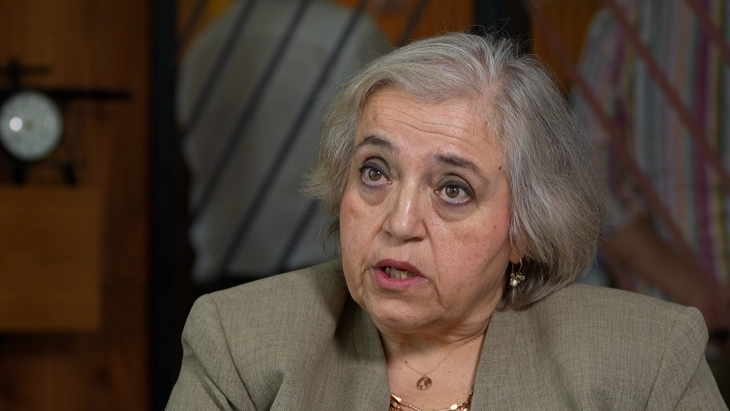Papadopoulou: President and PM not ordinary citizens, use of constitutional name not a personal matter
- The message from Greece will always be the same - a message of friendship to the citizens and the country. We are neighbors, NATO allies, I hope we will also be partners in the EU. Therefore, we want to reinforce this friendship. Greece wants to continue the close cooperation with your country but the basis of this cooperation is the Prespa Agreement. Strict adherence to all undertaken obligations under international law is the basis of this cooperation. I would like to hope and expect this cooperation will continue with the new government, says Greek Deputy Foreign Minister Alexandra Papadopoulou.
- Post By Ivan Kolekevski
- 22:12, 13 June, 2024

Skopje, 13 June 2024 (MIA) - The message from Greece will always be the same - a message of friendship to the citizens and the country. We are neighbors, NATO allies, I hope we will also be partners in the EU. Therefore, we want to reinforce this friendship. Greece wants to continue the close cooperation with your country but the basis of this cooperation is the Prespa Agreement. Strict adherence to all undertaken obligations under international law is the basis of this cooperation. I would like to hope and expect this cooperation will continue with the new government, says Greek Deputy Foreign Minister Alexandra Papadopoulou.
Deputy FM Papadopoulou, a former Ambassador of Greece in Skopje, took part at the ministerial meeting of the South-East European Cooperation Process (SEECP) in Skopje on Thursday.
When asked by 360 Degrees why is Greece reacting when both President Gordana Siljanovska Davkova and PM-designate Hristijan Mickoski have said they respect the Prespa Agreement and do not indent to challenge it, Papadopoulou says "words should be supported by actions", expecting a verbal use of the constitutional name.
Regarding arguments that everyone has the right of self-determination and freedom of expression, the Deputy FM says public office holders are not ordinary citizens but represent the country.
"Observance of an international agreement means that you act in accordance with the treaty's framework. The message is very clear - international agreements should be respected and we want to see actions that support such statements. On the contrary, statements are empty words. When the President, the Prime Minister, the Foreign Minister or the Defense Minister speak in an official capacity, they represent the state, and the state has a constitutional name that is agreed through an international accord resulting from UN Security Council resolutions. Let me be clear, the country's constitutional name is for all uses (erga omnes), in line with international law and it must be respected. This is not a personal matter," says Papadopoulou.
On the claims that North Macedonia has fulfilled the majority of its obligations arising from the Prespa Agreement while Greece has not even ratified three memoranda or changed the roadsigns containing the name Skopje or the acronym FYROM, Papadopoulou says North Macedonia joined NATO and started the EU accession negotiations as a result of the Prespa Agreement.
"The Prespa Agreement focused on your country's strategic orientation - NATO and EU - and change of the country's name in line with UN Security Council resolutions. Putting this at the same level with roadsigns is not right. In all sincerity, roadsigns are being replaced in Greece, many read Skopje and not the old name, the same as many roadsigns here read Thessaloniki or Athens. Let's talk about the big picture, the Prespa Agreement was reached for the sake of the large issues," says Papadopoulou.
She notes that the memoranda that have not been ratified in the Greek Parliament are not part of the Prespa Agreement.
"There were memoranda before, there will be memoranda in the future and they will be ratified. You also have memoranda here that are stuck but we are not saying that you are not implementing the Prespa Agreement," says Papadopoulou.
The Deputy FM expresses hope that the new government of North Macedonia "will realize and maybe it has already realized that it is in the interest of your country and in the interest of everyone that international obligations must be observed so that we make progress."
Photo: 360 Degrees







